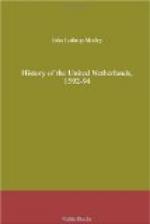She then sent for Sir Robert Cecil, whom she directed to go at once and tell his father, the Lord Treasurer, that he was to assist Caron in this affair exactly as if it were her own. It was her intention, she said, that her people were in no wise to trouble the Hollanders in legitimate mercantile pursuits. She added that it was not enough for her people to say that they had only been seizing Spaniards’ goods and money, but she meant that they should prove it, too, or else they should swing for it.
Caron assured her Majesty that he had no other commission from his masters than to ask for justice, and that he had no instructions to claim Spanish property or enemy’s goods. He had brought sufficient evidence with him, he said, to give her Majesty entire satisfaction.
It is not necessary to pursue the subject any farther. The great nobles still endeavoured to interpose delays, and urged the propriety of taking the case before the common courts of law. Carom strong in the support of the queen, insisted that it should be settled, as her Majesty had commanded, by the council, and it was finally arranged that the judge of admiralty should examine the evidence on both sides, and then communicate the documents at once to the Lord Treasurer. Meantime the money was to be deposited with certain aldermen of London, and the accused parties kept in prison. The ultimate decision was then to be made by the council, “not by form of process but by commission thereto ordained.” In the course of the many interviews which followed between the Dutch envoy and the privy counsellors, the Lord Admiral stated that an English merchant residing in the Netherlands had sent to offer him a present of two thousand pounds sterling, in case the affair should be decided against the Hollanders. He communicated the name of the individual to Caron, under seal of secrecy, and reminded the Lord Treasurer that he too had seen the letter of the Englishman. Lord Burghley observed that he remembered the fact that certain letters had been communicated to him by the Lord Admiral, but that he did not know from whence they came, nor anything about the person of the writer.
The case of the plundered merchants was destined to drag almost as slowly before the council as it might have done in the ordinary tribunals, and Caron was “kept running,” as he expressed it, “from the court to London, and from London to the court,” and it was long before justice was done to the sufferers. Yet the energetic manner in which the queen took the case into her own hands, and the intense indignation with which she denounced the robberies and outrages which had been committed by her subjects upon her friends and allies, were effective in restraining such wholesale piracy in the future.
On the whole, however, if the internal machinery is examined by which the masses of mankind were moved at epoch in various parts of Christendom, we shall not find much reason to applaud the conformity of Governments to the principles of justice, reason, or wisdom.




